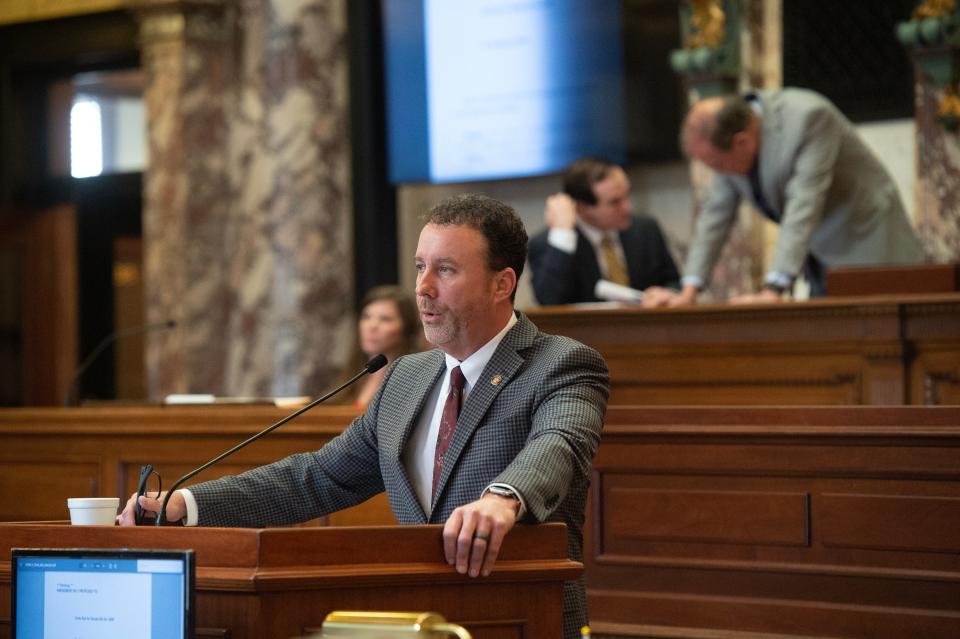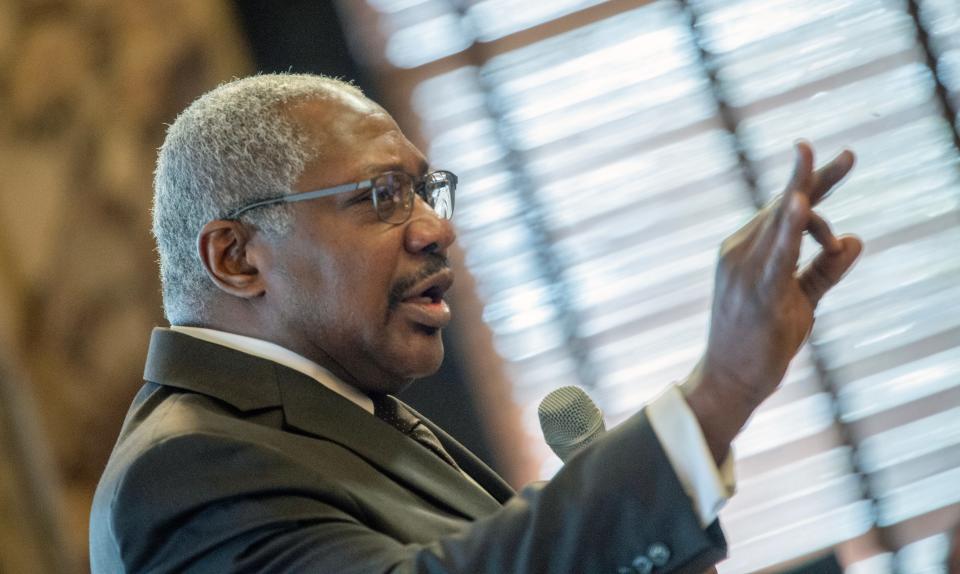Bill to regionalize the Jackson, MS water system takes step forward in Mississippi Senate
- Oops!Something went wrong.Please try again later.
The City of Jackson is one step closer to losing sole ownership of its troubled water system, after the Senate gave tentative approval to a bill Tuesday that would pave the way for the system to be run by a nine-member board.
That board, which would take over upon the departure of the system's federally appointed administrator, would be made up of four members appointed by the mayor of Jackson, three members appointed by the governor and two appointed by the lieutenant governor.
The bill's sponsor, Sen. David Parker, R-Olive Branch, said it was important to give the mayor the most seats on the board, and to list the mayor first in the bill despite traditionally listing the governor first due to that being the highest executive office in the state.
"My thought on this was, this water system has been used and managed by the City of Jackson for a long time, and I felt strongly that the mayor of Jackson should have the four appointees, and that his authority to make those appointees should be listed first in the bill," Parker said.

That said, while the mayor has more seats than either the governor or lieutenant governor, critics have pointed out that when the two state-offices are combined a majority of seats — five out of nine — are appointed by state leaders. Appointments would also require confirmation by the state senate.
Consultation on one appointment would be given to the mayor of Byram, which is part of the Jackson water system, and another to the mayor of Ridgeland, which is part of the Jackson waste-water system and where one of the water system's treatment plants is located.
However, a change was made on the Senate floor by Parker that would change which appointments required consultation. In the version of Senate Bill 2889 that passed committee last month, two of the Jackson mayor's appointments would require consultation, but in the new language approved by the chamber, the Byram mayor would have some say in one of the governor's appointments, while the Ridgeland mayor would do so for one of the lieutenant governor's.
Bill aimed at mayoral veto power:Bill saying mayors cannot veto no votes gets initial approval, amid Jackson trash fight
Bill would limit how porn can be viewed:Legislators consider bills to require age verification to access pornography on internet
MS AI battlefield technology:Mississippi company creates AI battlefield technology. Receives $17 million contract
This was just one of the changes that Parker said he made to the bill following conversations with Jackson Mayor Chokwe Antar Lumumba, Ridgeland Mayor Gene McGee and Byram Mayor Richard White. Parker said that questions from the news media also caused him to consider changes.
Parker said his meeting with Lumumba, which took place in his office last week was, "a great talk" and "very informative."
"I was hopefully able to add some concerns and take on a few things that I now see that are important to the City of Jackson in the process," Parker said. "By my meetings, I am in no way shape or form stating or saying that any of the mayors have endorsed this bill. As this bill moves along, I continue to be willing to speak and talk to anyone along the process. I think the feedback so far has allowed me to make the changes that you'll see, that I'm going to discuss now."
Lumumba has previously been steadfastly against any form of regionalization, saying that the city maintaining ownership of the water system and its revenue is essential to any path forward. Last week, Lumumba said the state was attempting to "colonize" the city through a number of bills. A spokesperson for Lumumba said the mayor's position on regionalization has not changed, but confirmed that the meeting last week with Parker was cordial.
In addition to appointment changes, Parker added language that would make the board a non-profit and revert ownership back to Jackson if the regional authority were to one day be dissolved. Though he has yet to meet with the system's manager, Ted Henifin, Parker said he has reviewed his recently released documents, and plans to meet with him next week.
"[Henifin] has not been available," Parker said.
Parker said based on his reading of Henifin's recommendations, there are five potential paths forward for the governance of Jackson's water system once it is no longer under federal conservatorship. The first possibility would be privatization, which Henifin opposed. The other four ideas are to put the system back in the hands of the city, to create a non-profit to oversee the system, to create a regional authority to oversee the system and to create a local utility authority. Henifin did not indicate which direction would be best, and Parker said the change to the bill is an attempt to merge the regional authority and non-profit options.
"I tried to take the non-profit concept and roll that into what we were considering for the regional utility authority, so in my amendment we're making this regional utility authority be a non-profit. We're mirroring it similar to what we did with the lottery bill," Parker said.
Seemingly in contrast to Parker's claims that he is following aspects of the administrator's vision, Henifin himself has voiced concerns in recent days that the state legislature may try to divert federal funds away from important projects in Jackson, telling the Mississippi Free Press and ProPublica "I believe the $600+ million in federal funding has created a monster in the Mississippi Legislature."
Parker directly addressed those concerns Tuesday, after they were brought up by Sen. John Horhn, D-Jackson. Parker said the board would be required to be made up of ratepayers, and that federal funding, about $600 million of which has already been appropriated, would be used only within the system.
"Every single dime that is coming from the federal government is intended for and will be used inside of the area that is cited by the Clean Water Act," Parker said.
Legislative Black caucus:How the Mississippi Legislative Black Caucus has changed, served members over the years
Parker, who represents a district in Northern Mississippi, said this bill is important to him because Jackson is the Mississippi capital, but also because his daughter lives in Jackson and he lives with her during session.
"I do this because I know that in this city and this region that we have an opportunity to do better, and that we can do better," Parker said.

Parker faced questions and criticism from a number of Democratic Jackson-based lawmakers, including Horhn, Sen. Barbara Blackmon, Sen. Sollie Norwood and Sen. Hillman Frazier.
Horhn asked why someone from DeSoto County would "want to interfere" in Jackson's business.
"I am a rate payer in the city of Jackson. I am a customer," Parker said.
"You might lay the claim that you live here too, three or two months out of the year, but your constituents don't. Our constituents live here," Horhn said later during debate.
As Horhn spoke, a group behind him grew from other Jackson Senators — Norwood, Frazier and David Blount — to include a majority of the chamber's Democratic members.
Horhn said that the legislation would be taking a major asset away from Jackson, despite opposition from Jackson's delegation in the body and its local elected leaders.
"We're taking this asset, a multi-million-dollar asset, without any compensation, without any real compromise, we're just we're going to do it because we can do it. You know, somebody once said just because you can, doesn't mean that you ought to. This is a situation where we ought not do this," Horhn said. "I pray for the day when the leadership of Jackson and from the governor on down the leadership of this state will come together and say 'Look, we've got some problems. We know we have some problems. We know the problems are massive. We need help.'"
Norwood and Blackmon made similar points, saying that Jackson would not be compensated for losing ownership of the system.
"This third party manager is overseeing the asset of the City of Jackson, and this regional authority would be taking all of those assets without having paid one cent for those assets," Blackmon said.
Parker responded that he sees the assets as belonging to ratepayers, not the city government.
"I've lived here for 52 years, I certainly understand the challenges that we've had with the water system, but I do not support the efforts to take over, to take away from Jackson one of its largest assets," Norwood said.
Parker told Norwood that he is committed to working with those that oppose the bill to make it better, even if it does not change their minds on voting against it.
The bill is one of a number making their way through the legislature that would impact Jackson over the opposition of Jackson lawmakers.
"We can't live with this. We're telling you we can't live with it, and it looks like you're going to do it anyway," Horhn said.
Before passage, Horhn succeeded in adding a reverse repealer to the bill, a move that Parker ultimately supported. This procedural action would technically cause the legislation to expire before it ever takes effect. In reality, it is a move legislators use to get a bill through a chamber before a deadline, only to come back later and make changes.
"We will make modifications that are necessary, that are in the best interests of ratepayers," Parker said. "With the reverse repealer, I'll continue to have my door open."
The bill passed the Senate on a party line vote of 34-15. It will now head to the house, where it may be changed. Even if it passes both chambers as written, it would need to come back up later in session for the reverse repealer to be removed.
"As we all know, this bill is the type of bill that is likely to come back to this chamber later on," Parker said.
Parker said that the reason for passing this bill now, while Henifin is only a few months into his work, is because the administrator said a path forward on governance should be decided by the end of September. Horhn said that Henifin has the authority to make that decision himself, which Parker later acknowledged, but Parker said that the state should have a say and should represent the ratepayers.
"Make no mistake, the receiver will put something in place then," Parker said. "It might be better than what I'm suggesting, but it might be worse."
A separate bill, which passed the Senate last month, would prevent Henifin from implementing his planned billing structure for the water system. Parker voted present, and explained that vote Tuesday, saying he did not want to appear to have an opinion on billing while also proposing a new governing body that may one day decide on rates.
This article originally appeared on Mississippi Clarion Ledger: Senate passes bill aimed at regionalizing Jackson MS water

